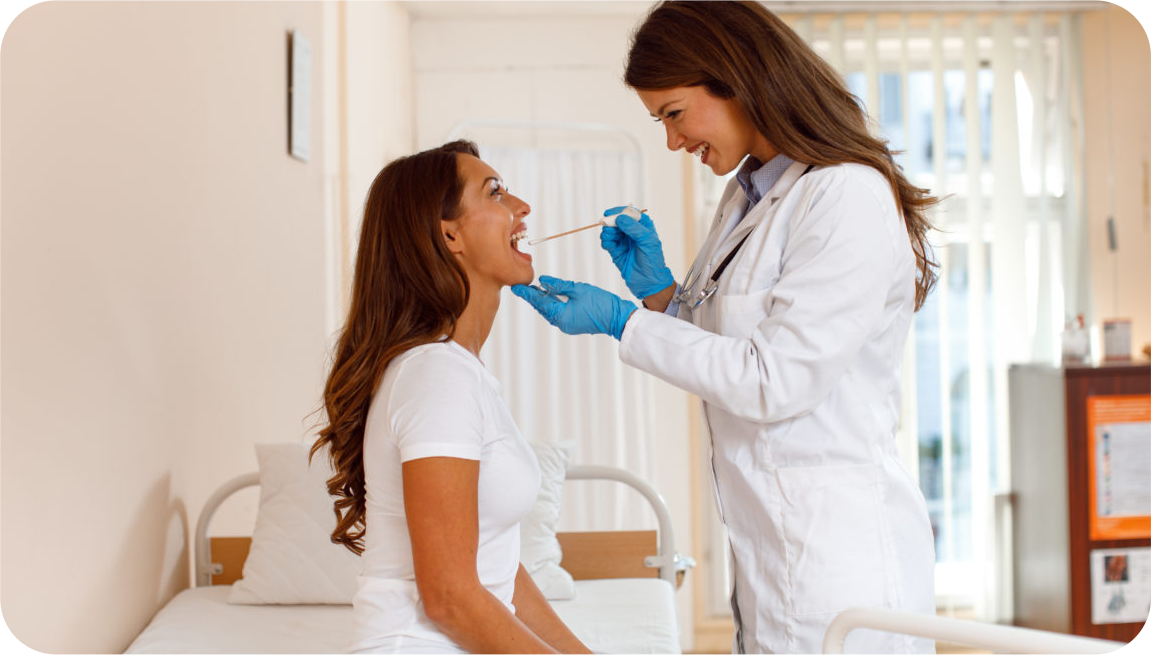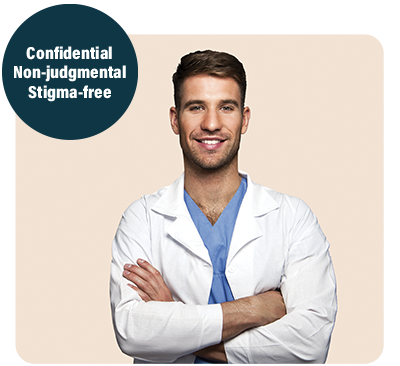OMG! WHAT IF I HAVE AN STI?
It’s OK. It happens. It’s common. And you’ve come to the right place! At Music City PrEP Clinic, there is no shame, no stigma, no judgment. In most cases, STIs are easier to treat than strep throat. And while there is no cure for the common cold, there is a cure for gonorrhea, chlamydia and syphilis. So there’s no shame in your game—we’ve got you covered. To ease your mind, here is some information on the most common STIs and how they are treated.

CHLAMYDIA
Chlamydia is the most commonly reported sexually transmitted infection.
- It’s spread through oral, anal and/or vaginal sex.
- Most people do not have symptoms.
- Sometimes there is an unusual discharge from the penis or vagina and/or a burning sensation while urinating.
- Testing involves urine collection, as well as an oral swab and an anal swab. Infection is not always found in urine, so we test these additional areas where infection may be present.
- It’s treated with oral antibiotics.
- Once treated, you can get chlamydia again if your sex partners are not tested and treated.
GONORRHEA
Gonorrhea is the second most commonly reported sexually transmitted infection.
- It is spread through oral, anal and/or vaginal sex.
- It infects the reproductive tract and can also infect the mucous membranes of the mouth, throat, eyes and rectum.
- Most people do not have symptoms.
- Men experience painful urination and a white, yellow or green discharge.
- Women often mistake symptoms for a bladder or vaginal infection.
- Oral and rectal infections are also typically asymptomatic. Rectal infections may include discharge, anal itching, soreness, bleeding or painful bowel movements. Oral infections may include a sore throat.
- Testing involves urine collection, as well as an oral swab and an anal swab. Infection is not always found in urine, so we test these additional areas where infection may be present.
- It is treated with an injection of antibiotics.
- Once treated, you can get gonorrhea again if your sex partners are not tested and treated.
SYPHILIS
Syphilis is a sexually transmitted infection that can cause serious health complications. There are four stages (primary, secondary, latent and tertiary) that syphilis will progress through if left untreated.
- It’s spread through oral, anal and vaginal sex. Syphilis can also be spread through skin-to-skin contact with a primary sore, which is a symptom of the primary stage of syphilis.
- The primary stage has one symptom—a small, painless primary sore that many do not notice.
- The secondary stage includes a skin rash, swollen lymph nodes, fever and/or hair loss. Not everyone experiences secondary symptoms.
- The latent stage does not have symptoms and the tertiary stage of syphilis is linked to severe medical problems including neuro- logical and neuralgic (brain and nerve) problems, eye problems and even blindness.
- Syphilis is detected through a blood test. Treatment includes injection(s) of penicillin. The number of injections required to treat the infection (1 to 3) is determined by the stage you are in when you’re examined by your provider.

HIV
Human Immunodeficiency Virus (HIV) is a sexually transmitted infection that weakens the immune system by destroying cells in the body that fight disease and infection.

Currently, there is not an effective cure for HIV; however, HIV can be controlled. MCPC offers testing for HIV, and PrEP to prevent the transmission of HIV. With medication, someone living with HIV can have the same lifespan as someone without HIV. We also now know that when taking effective HIV treatment, someone living with HIV cannot transmit HIV through sex, even if condoms aren’t used.
- HIV is spread through vaginal or anal sex or by sharing needles and syringes used to inject drugs.
- Testing includes a blood test.
- If test results indicate you do have HIV, the providers at MCPC will offer assistance and connect you with a provider who specializes in HIV management.
HEPATITIS
Hepatitis is a virus that causes inflammation of the liver. MCPC offers testing for hepatitis A, B and C. If you test positive for hepatitis, we will connect you with a specialist who can manage your care.
- Hepatitis A is spread through close personal contact with an infected person or through contaminated food or drinks.
- Hepatitis B is spread by exposure to the blood, semen or other bodily fluids of someone who is infected.
- Hepatitis C is spread by exposure to the blood of someone who is infected.
- Symptoms for hepatitis A and B include fatigue, nausea, stomach pain and jaundice.
- Hepatitis C initially may not cause symptoms. However, if symptoms occur, they are often a sign of advanced liver disease.
- Getting the hepatitis A and B vaccines are the best way to protect yourself against hepatitis A and B.
- There is no vaccine for hepatitis C, but there is a cure.

OTHER SEXUALLY TRANSMITTED INFECTIONS
There are many infections that can be spread with intimate contact with others. Two STIs we are asked about, but we do not test for, are herpes and human papillomavirus (HPV).
- Herpes is extremely common and there is no cure; however, the infection can be managed through the use of medication.
- HPV is also common. MCPC does not test for HPV. We can connect you to other medical providers that can assist you.
If you were treated for an STI,
WE RECOMMEND THE FOLLOWING:

OUR GOAL IS TO PROVIDE PrEP & HIV CARE AT THE LOWEST COST POSSIBLE TO OUR PATIENTS...
regardless of income or whether or not you have insurance.
We’re a unique non-profit organization on a mission to end HIV. Choosing us to provide your care funds our ability to reach even more people with our services.
